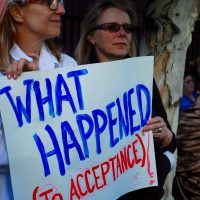 Author, speaker and talk show host Julie Roys reminds us that when it comes to the sin of homosexuality, Christians must remember that “The same power that raised Christ from the dead is alive in us. We should not be resigned to defeat; we should be proclaiming the hope of victory. We should not be affirming the sin nature; we should be affirming the new creation.”
Author, speaker and talk show host Julie Roys reminds us that when it comes to the sin of homosexuality, Christians must remember that “The same power that raised Christ from the dead is alive in us. We should not be resigned to defeat; we should be proclaiming the hope of victory. We should not be affirming the sin nature; we should be affirming the new creation.”
In this must read post, Roys addresses evangelicals’ concerning response to the gay issue. She writes:
It was the most depressing conference I’ve ever attended. For two days, people on different sides of the gay issue debated how Christians should counsel those with same-sex attraction. Some pushed for gay affirmation and full acceptance of same-sex relationships; others upheld the Bible’s prohibition on homosexuality and urged gays to remain celibate. Many expressed sympathy and compassion. But none believed in healing – and no one offered hope.
I couldn’t help but recall that conference when I heard Pope Francis’ reported comments to a gay man several days ago that “God made you like this. God loves you like this.”
The LGBT community is hailing the comments as a sign of the pope’s great compassion and enlightenment. And certainly, the pope’s message that God loves people who identify as gay is true, and in some segments of the church, extremely overdue.
But the pope’s alleged statement that God would make someone gay and would want him to stay gay goes against Scripture and established Christian doctrine. The Vatican will not confirm or deny the comments, so it’s possible the pope was misquoted. Yet the comments seem congruous with the pope’s statement in 2013: “If a person is gay and seeks God and has good will, who am I to judge?”
This is what happens when compassion is divorced from truth and any hope of transformation. And sadly, it’s not just the alleged position of the pope and many in society, but of many evangelicals too. This should not be.
Evangelicals’ Depressing Response to the Gay Issue
The conference I attended in 2015 was distinctly evangelical and marked a departure from the message of hope and healing that evangelicals used to hold out for those struggling with same-sex attraction.
Matthew Vines, a gay Christian leader, argued that condemning same-sex relationships results in psychological harm. It merely produces the so-called “bad fruit” of brokenness and pain among same-sex attracted Christians.
Similarly, David Gushee, a prominent Christian ethicist, said, “What (condemnation of all gay relationships) does to the (gay) 16-year-old in the church is it creates a disastrous box out of which he cannot escape with any good options from the church. So, we have kids throwing themselves off of bridges because they are in such despair because of what they have been taught and how they have been treated.”
That kind of emotional argument was pretty hard to combat, but some tried. Julie Rodgers, who at the time was an avowed gay, celibate counselor at Wheaton College, argued that gays could remain single, yet fulfilled. She said her attempts to change her sexuality proved futile, but added, “I just trust that the boundaries God put around sexuality are for our flourishing.”
However, Andrew Sullivan, a gay Catholic columnist, pushed hard against the notion of gay celibacy. “The argument being made is that gay people should be somehow eunuchs,” he said. “And, I’m saying that practically speaking in the world, it just can’t happen.”
Additionally, Sullivan suggested that gay celibacy leads to things like the sex abuse scandal in the Catholic church. “I’ve seen what that does to people. I’m from a church where that syndrome created an atmosphere and a culture that perpetuated the rape of thousands of children.”
I came away from the conference extremely sad. The outlook offered same-sex attracted Christians was so incredibly bleak. I knew there was a better way, but unfortunately, no truly redemptive options were even presented.